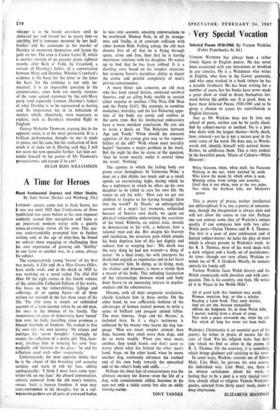Very Special Vocation
VERNON WATXINS has always been a rather lonely figure in English poetry. He has never been associated with any movement or involved in any coteries. He is a Welshman who writes in English, who lives in the Gower peninsula, and who once worked in a bank (where he has a notable forebear). He has been writing for a number of years, but his books have never made a great show or tried to thrust themselves for- ward before the public eye. It is good, then, to have these Selected Poems 1930-1960 and to be given a chance to assess his contribution to English literature.
Just as Mr Watkins does not fit into any school of poets, neither can he be easily classi- fied by subject-matter or method. He is a 'poet who deals with the largeit themes—birth, death, love, renewal—yet he is not a nature poet in the strict sense of the word. He does not, as Words- worth did, identify himself with natural forms. Rather, he celebrates them. This is very evident In the beautiful poem, 'Music of Colours—White Blossom':
White blossom, white, white shell; the Nazarene Walking in the ear; white touched by souls Who know the music by which white is seen, Blinding white, from strings and aureoles, Until that is not white, seen at the two poles, Nor white the Scythian hills, nor Marlowe's queen.
This is poetry of praise, neither intellectual nor philosophical. It is, too, a poetry of sensuous- ness, though the imagination is always alert and will not allow the senses to run riot. Perhaps one can convey some idea of Watkins's unique quality if one compares him with two other Welsh poets—Dylan Thomas and R. S. Thomas. The first is a poet of pure celebration and of limited subject-matter; he lacks the play of mind which is always present in Watkins's work. As 'for R. S. Thomas, most of his work deals with a dark religion and a hardy set of parishioners. At times (though not very often), Watkins re- minds me of W. S. Graham. Mostly, he remains entirely his lonely self.
Vernon Watkins faces Welsh history and the Welsh countryside with devotion and with com- passion. This is his country, one feels. He writes of it in 'Peace in the Welsh Hills': All of good faith that fountain may recall, Woman, musician, boy, or else a scholar. Reading a Latin book. They. seem distinct, And yet are one, because, tranquillity Affirms the Judgment. So, in these Welsh hills, I marvel, waking from a dream of stone, That such a peace surrounds me, while the city For which all long has never yet been built.
Watkins's Christianity is an essential part of his poetry; he writes in praise of nature for the sake of God. Yet his religion lacks that dark side which we find so often in the poems of R. S. Thomas. On the contrary, it is something which brings gladness and rejoicing to his verse.
In some ways, Watkins reminds me of Edwin Muir. Like Muir, he pursues his own course, his individual way. Like Muir, too, there is an intense seriousness about his work, a feeling that to be a poet is a very special voca- tion, closely allied to religion. Vernon Watkins's poems, selected from thirty years' work, make a deep impression. ELIZABETH JENNINGS






























 Previous page
Previous page